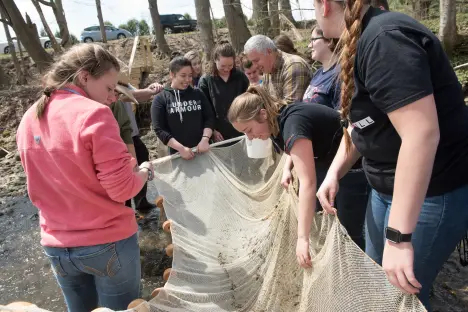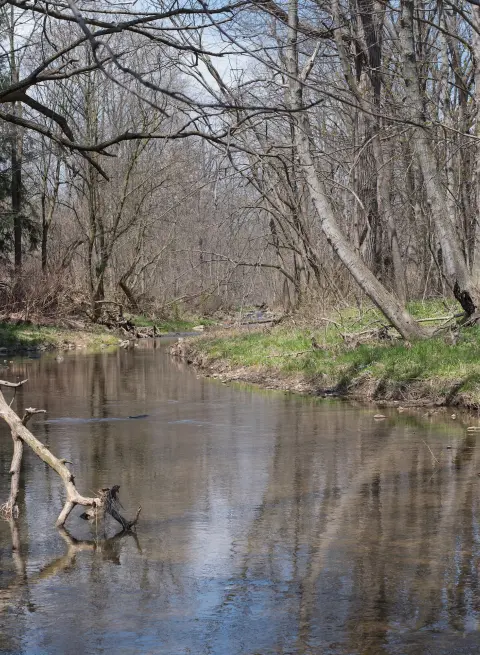
Environmental Science Program Overview
Climate change. Water resources management. Emerging pests and invasive species. The changing energy economy. When you think of these challenges, it’s easy to understand why Environmental Science is one of the most in-demand scientific fields of study.
Environmental science is truly interdisciplinary, with a majority of real-world projects requiring collaboration among scientists and other professionals with different expertise. That’s why Ashland University offers double majors in:
- Environmental Science and Biology
- Environmental Science and Chemistry
- Environmental Science and Toxicology
You’ll train in science fundamentals, as well as how science can inform discussions of national and global environmental issues.
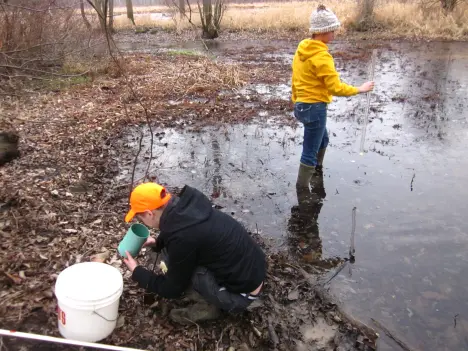
Learning Experiences
- Emphasis on the development of strong writing and research skills.
- Professors are committed to educating and mentoring students. They teach all classes and labs personally and serve as advisors throughout a student’s time at Ashland University.
- Opportunities to participate in research as early as your freshman year and to present findings at regional and national professional conferences.
- Access to five environmental preserves, a 2,500-square-foot greenhouse and state-of-the-art equipment.
- The Environmental Lecture Series introduces students to experts from other universities, government agencies and nonprofit organizations and creates opportunities for students to network with professionals.
Learn more about our faculty's research that involves students who learn to use lab and field equipment, do group work, present project ideas and go in-depth into active science.
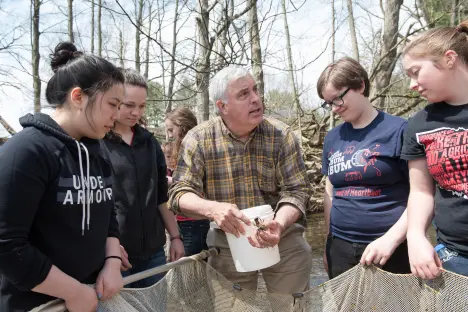
Sample Curriculum
This double major is designed for students who wish to pursue a career in Environmental Science or in Biology, Chemistry or Toxicology with an emphasis in Environmental Science.
For additional information about the Environmental Science curriculum, review the Academic Catalog, course rotations and four-year curriculum guides:
- Environmental Science & Biology Four-Year Curriculum Guide
- Environmental Science & Biology Course Rotation
- Environmental Science & Chemistry Four-Year Curriculum Guide
- Environmental Science & Chemistry Course Rotation
- Environmental Science & Toxicology Four-Year Curriculum Guide
- Environmental Science & Toxicology Course Rotation
First Year
Second Year
Third Year
Fourth Year
Scholarships

Ashland University has been awarded a grant from the state of Ohio to provide Choose Ohio First Scholarships to outstanding students with interests in the natural and physical sciences. These scholarships support academically strong students who plan to continue to graduate school, health-related professional programs or employment in STEM industries after completing a bachelor’s degree.
AU Dean's Scholarship
The Dean's Scholarship was created to enhance the undergraduate academic experience for new first-time and transfer students enrolled in a major within the College of Arts & Sciences. It is a merit-based, renewable scholarship that can be "stacked" on top of other awarded AU academic scholarships. In addition, students have the opportunity to participate in unique academic communities with a focus on career coaching and preparation.
Ohio EPA Scholarship
These merit based, nonrenewable scholarships will be given to undergraduate students enrolled at an Ohio public or private college/university who can demonstrate their knowledge and commitment to careers in environmental sciences or environmental engineering. Students must be entering their Junior or Senior year. Awardees will be selected by the Academy appointed panel.
Summer Student Internships
You’ll have opportunities for grant-supported and full-time summer research internships on campus and support for seeking similar opportunities off campus.
- The Ohio Agricultural Research and Development Center and Northeast Ohio Biology Consortium provide internship opportunities.
- Environmental science faculty have research programs funded by the National Science Foundation and National Institutes of Health that involve undergraduates for summer research projects.
- Students frequently participate in the National Science Foundation's Research Experience for Undergraduates Program, with well-paid summer internships in a variety of disciplines.
Graduate Outcomes
An environmental science degree prepares you for employment or graduate study in a diverse range of fields. Ashland University graduates work for state and federal government agencies, universities and nature centers, environmental service labs and other businesses that need science skills and in-depth understanding of environmental issues.
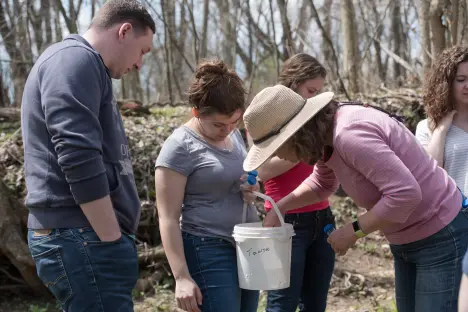
Career Opportunities
Employment of environmental scientists and specialists is projected to grow seven percent from 2023 to 2033, faster than average for all occupations. About 8,500 openings for environmental scientists and specialists are projected each year, on average, over the decade. The median pay for environmental scientists and specialists was $78,980 in 2023. (Bureau of Labor Statistics)
